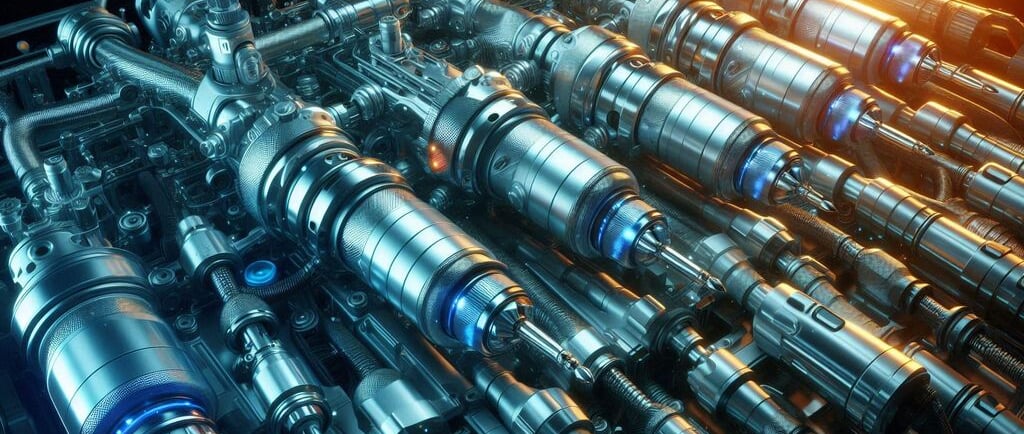Fuel Injectors: Atomize fuel for efficient combustion.
When it comes to making the most of every drop of fuel, fuel injectors are an unsung hero under the hood.
TRANSMISSION COMPONENTS
11/12/20244 min read


Fuel Injectors: Atomize Fuel for Efficient Combustion
When it comes to making the most of every drop of fuel, fuel injectors are an unsung hero under the hood. These small components play a significant role in your car’s performance and fuel efficiency by delivering the perfect mix of air and fuel into the engine. In this article, we’ll cover what fuel injectors do, how they work, common issues, and tips for maintenance to keep your car running smoothly.
What Are Fuel Injectors?
Fuel injectors are electronic valves that spray fuel directly into an engine’s intake manifold or combustion chamber. By atomizing fuel—that is, breaking it down into a fine mist—fuel injectors make it easier for the fuel to mix with air and ignite in the engine. This process results in cleaner, more efficient combustion compared to older systems, like carburetors, which relied on mechanical mixing methods.
Key Functions of Fuel Injectors
Atomizing Fuel: The main job of a fuel injector is to atomize fuel, breaking it into tiny droplets. This fine mist allows for a more thorough mix with air, making combustion quicker and more efficient.
Controlling Fuel Delivery: Modern fuel injectors are connected to the car’s engine control unit (ECU), which controls when and how much fuel is injected based on various sensors.
How Fuel Injectors Work
The fuel injection process may seem complex, but it’s all about precision and timing. Here’s how it works:
Receiving a Signal: When you press the gas pedal, the ECU signals the fuel injectors to release fuel. This signal is based on the amount of air entering the engine, engine temperature, and other sensor inputs.
Spraying Fuel: The injector valve opens, allowing fuel to pass through a nozzle and spray into the intake manifold or directly into the combustion chamber. This spray pattern ensures fuel disperses evenly.
Fuel-Air Mixing and Combustion: The atomized fuel mixes with air, and the engine’s spark plug ignites the mixture, generating power to drive the vehicle.
This finely tuned process is why fuel injectors are crucial for engine performance, emissions control, and fuel efficiency.
Types of Fuel Injection Systems
Port Fuel Injection (PFI): This common system injects fuel into the intake manifold, where it mixes with air before entering the combustion chamber.
Direct Fuel Injection (DFI): In DFI systems, fuel is injected directly into the combustion chamber, allowing for more precise fuel delivery and better efficiency.
Sequential Fuel Injection: Each injector fires independently, following the engine’s firing order, which allows for more precise timing.
Common Fuel Injector Issues
Over time, fuel injectors can develop issues due to wear, carbon buildup, or clogs. Here are some of the most common problems:
Clogged Injectors: Dirt, debris, and carbon deposits can clog injectors, leading to reduced fuel flow and inefficient combustion. Symptoms of a clogged injector include rough idling, poor fuel economy, and slow acceleration.
Leaking Injectors: A leaking injector can disrupt the air-fuel ratio, leading to hard starts, poor fuel efficiency, and even engine misfires.
Electrical Problems: Since fuel injectors rely on electronic signals, any wiring or connection issues can cause the injector to malfunction. This may result in erratic performance, or even an injector that fails to open or close completely.
Signs Your Fuel Injectors Need Attention
If you’re noticing any of the following issues, it may be time to inspect or service your fuel injectors:
Rough idle or misfiring: If your car is idling roughly or misfiring, a clogged injector might be the culprit.
Poor fuel economy: A faulty injector can cause an engine to use more fuel than necessary.
Starting problems: Hard starts or delays in cranking could be due to fuel injector problems.
Check engine light: A malfunctioning injector can trigger the check engine light.
Maintaining and Cleaning Fuel Injectors
Routine maintenance of your fuel injectors can prevent costly repairs down the line. Here are some tips to keep them in top shape:
Use High-Quality Fuel: High-quality fuel often contains detergents that can help keep injectors clean. Low-quality fuel can lead to deposit buildup over time.
Add Fuel Injector Cleaner: Using a fuel injector cleaner periodically can help remove deposits and reduce clogging. These cleaners are easy to add to your fuel tank and can improve injector performance.
Professional Cleaning: If you notice performance issues or suspect that your fuel injectors are clogged, consider having them professionally cleaned. Many mechanics offer fuel injection cleaning services that use pressurized cleaning systems to remove buildup.
DIY Tips for Cleaning Fuel Injectors
For car owners who prefer hands-on maintenance, some DIY fuel injector cleaning kits are available. While not as effective as professional cleaning, these kits can provide a temporary solution for minor injector clogs.
Add fuel system cleaner to your tank as a preventive measure.
Use a DIY cleaning kit following the instructions carefully, as improper use could damage the injectors.
Why Fuel Injectors Matter for Fuel Efficiency
Fuel injectors play a pivotal role in optimizing fuel efficiency. By ensuring the right amount of fuel mixes with air for combustion, they reduce waste and lower emissions. Clean, well-functioning injectors allow your engine to run more efficiently, saving you money at the pump and contributing to lower overall emissions.
Fuel injectors have become increasingly important as automakers strive to meet stringent emission standards. According to the EPA, fuel injection technology is one of the key advancements that have helped reduce vehicle emissions over the past few decadesclusion: Keep Your Fuel Injectors in Top Condition
Fuel injectors are a critical component of any vehicle’s fuel delivery system, responsible for atomizing fuel for efficient combustion. With proper maintenance, including periodic cleaning and using quality fuel, you can ensure they continue to function well. Keeping your injectors clean not only improves your car’s performance but also helps you save on fuel costs.


